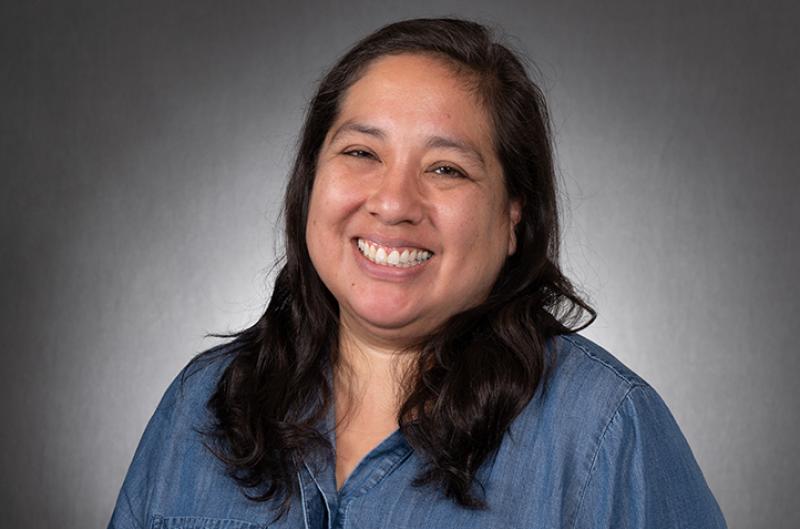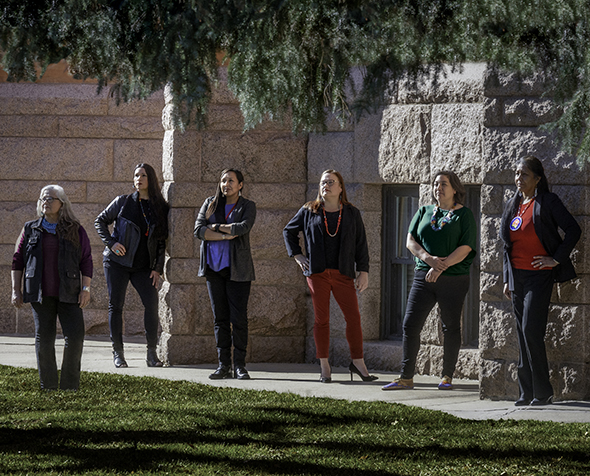Native American Scholar Brings Important Perspective to History Classrooms
Meet new history faculty Angela Parker.

“Who discovered America first — Christopher Columbus or Leif Erickson?” This seventh-grade essay assignment first prompted Angela Parker, new faculty in DU’s Department of History, to invest in history as a school subject. In response, Parker wrote an essay that centralized Native American experience and served as a reminder of history’s many narratives:
“I wrote a five-paragraph essay arguing (with support from the sources we were asked to reference) that a good historian would never ask such a biased question because it implies that Native Americans didn’t exist or didn’t matter.”
Growing up in a Native family, Parker was attuned to the importance of whose stories get told — and whose are marginalized or erased altogether.
“My family not only endlessly discusses and dissects complicated genealogical information, but uses stories of people and disagreements from three generations back to explain the present-day behaviors and motivations of their descendants.”
Parker now teaches twentieth-century Native American and US history. Taking historical perspectives into the classroom allows for opportunities “to discover that humanity is both terrible and beautiful, and that — if we approach and learn about the past using thoughtful and critical analyses — we are not doomed to repeat it.”
As Parker explains, “History is essentially a set of stories we tell in order to explain not only our past but to justify our present and to create an intellectual structure for the future. The histories we choose to collectively acknowledge and know impact every facet of our worldview and what we believe is possible or impossible.”
Parker appreciates the way DU’s department offers students a wide diversity of courses in history, as well as the steps the University has taken regarding the Evans Report.
“Not many institutions prefer to acknowledge or try to deal productively with history tied to the violent and radical displacement of Native people in Denver and Colorado generally. While we have more work to do regarding the findings of the Evans Report, at least DU has begun the conversation.”
Starting conversations is part of what Parker sees as history’s crucial importance:
“The practice of history (deep engagement with primary sources, critical analyses of secondary sources and the creation of synthesizing arguments that explain how and why change over time occurred) allows students to practice skills that are portable across the academy, regardless of their home discipline, and vital for being able to full practice their rights and responsibilities as citizens of the US and of the world.”
In Parker’s courses, cultural sources like music, art, material culture, poetry, novels, films, oral histories and archival materials are all rich primary sources to be explored.
“I center my teaching around a diverse and vibrant primary source base, and emphasize a close and deep engagement with those sources. This year, my classes are Seeing Red: Native Americans and Photography, Twentieth-Century Native American History, Twentieth-Century US History and Native Crude: Indigenous Oil Politics and Activism.”
Parker’s current research is focused on a hydroelectric project that flooded Plains Indian reservations, including her own, in the 1950s. She is currently revising this manuscript, which marks a turning point in Native American history.
“It is a moment in which a shared feeling of betrayal across the country became one of the catalysts for National activism of the following decades, and laid the foundation for narratives of tribal self-determination and sovereignty later in the twentieth century.”
In the classroom, as well as in her own scholarship, Parker seeks opportunities to keep learning:
“The best part of being a professor is being able to continue learning, producing knowledge and teaching for the rest of your life. Learning is hard and humbling, but it is also immensely gratifying and energizing. And generally, the best scholars are those who are willing to be brave, engaged, hardworking and humble enough to accept that we are all learners regardless of our degree or title.”





